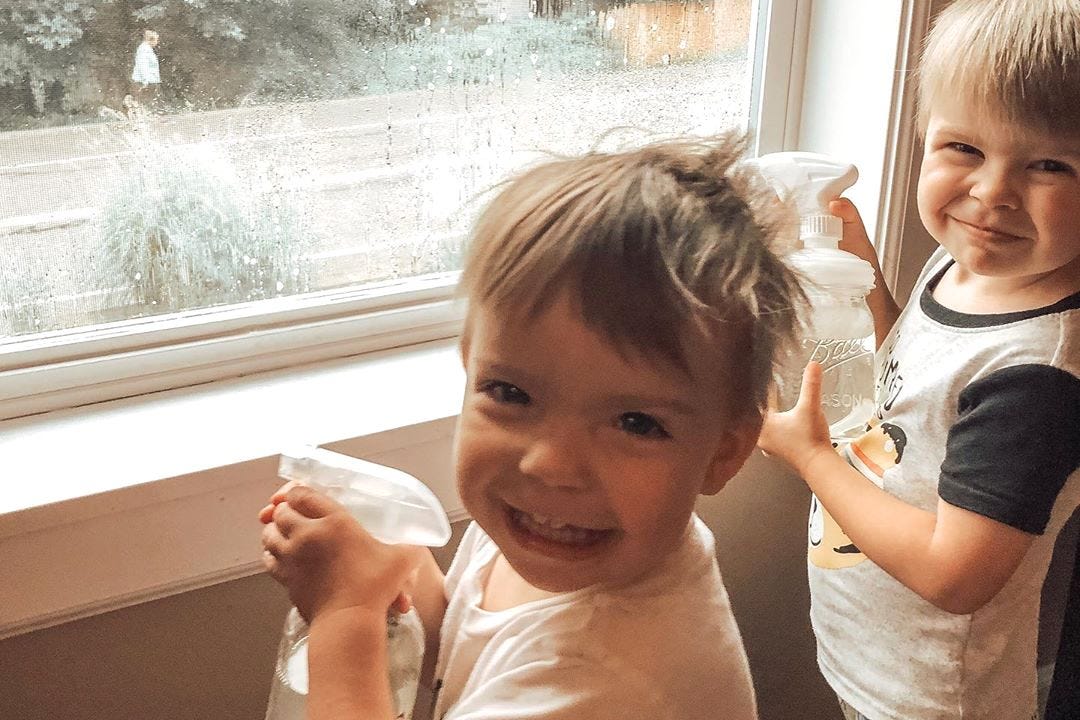Six Amazing Alternatives to Chemical Cleaners
In this blog, MasonJars highlights common cleaners’ dangers, as well as effective alternatives to standard cleaners, and how to achieve a clean home without using chemical-based products.
From home to work, school, or any other establishment, cleanliness is essential to our well-being. And, amid the COVID-19 pandemic and flu season, we are on extra high alert, working to provide a safe and clean environment for ourselves and anyone sharing space with us.
However, combating viruses and bacteria does not come without a potential cost, given certain cleaning products’ chemical composition. From skin irritation and headaches to cancer-causing chemicals and flammable products, many common household solutions can cause injury.
Fortunately, you can minimize the risks associated with chemical-based cleaners by taking the necessary precautions and limiting your exposure or avoiding them altogether. In this blog, MasonJars highlights common cleaners’ dangers, as well as effective alternatives to standard cleaners, and how to achieve a clean home without using chemical-based products.
*Note: Despite their versatility and effectiveness, these cleaners do not kill the Coronavirus.

Risks of Common Cleaners
Common cleaners, due to their chemical composition, are associated with a number of risks. A warning label often indicates a cleaner’s dangers on the front of the product or near the list of ingredients found on the backside. For example, you may recall reading “Keep out of reach of children,” “Caution: Harmful if swallowed,” “Danger: Corrosive,” and “Warning: See back label for additional precautionary statements” on several of these products.
According to the Environmental Working Group (EWG), many household cleaners and the companies that make them do not reveal enough information about the product on its label for customers to make informed decisions. EWG reports: “[government scientific and regulatory agencies] have devoted far fewer resources to evaluating substances that may be toxic to the brain and nervous system, the hormone system, and other organs.” While we may read that a product contains cancer-causing agents, its other potential impacts are often omitted from the product label.
The Organic Consumers Association states that the use of common cleaners may cause:
- Asthma
- Cancer
- Chronic respiratory problems
- Dizziness
- Eye, skin, and throat irritation or burns
- Headache
- Nausea and vomiting
- Reproductive complications
Bearing these risks in mind, you must examine the label on your cleaning supplies before proceeding to use them.

Alternatives to Common Cleaners
Despite the numerous precautions you may take, we recommend using cleaning alternatives that you can make at home. Creating personal cleaning products ensures that you have a better understanding of the ingredients and the potential impacts they may have on your health. However, there is still a time and place for chemical-based cleaners, such as in a public office space.
If you’re interested in mixing up your cleaners, we recommend using a reCAP® Mason Jars Lid Sprayer Cap with one of our Mason jars. Here are a few household items that can help you create a safer and more eco-friendly cleaner:
*Note: Outside of this list, please remember to do your research before combining any two or more products together as some solutions may have an adverse effect upon mixing. You may also want to use these homemade mixtures in a small, inconspicuous area first to monitor surfaces for any undesired effect.
1. Vinegar
Distilled vinegar works to eliminate dirt, grease, soap scum, and grime. To create the perfect cleaning solution, mix equal parts of vinegar and water. The combination of vinegar, dish soap, and water also works as a natural flea repellent for dogs and fabric surfaces! This solution may also work to remove stains from carpeting.
2. Lemon Juice
Like the vinegar solution, lemon juice alone eliminates grease and dirt. It also gives surfaces a nice shine and pleasant smell. If you need a stronger cleaning solution, mix one-part lemon juice, one-part vinegar, and two-parts water. Lemon juice is also ideal for the sanitization of surfaces and bleaching fabric.
3. Homemade Glass Cleaner
For a natural glass cleaner, mix one cup of rubbing alcohol, one cup of water, and one tablespoon of white vinegar together in a Mason jar of your choosing. You may also add a drop or two of any essential oil to give the cleaning solution an enjoyable scent.
4. Furniture Polish
Combining equal parts virgin olive oil, water, and vinegar makes for the best furniture polish. However, first only apply a small amount of the solution to your furniture to see how the two react. If there is no adverse reaction or dissolving of the wood, carry on with cleaning!
5. Drain Cleaner
Drain cleaner can be made by first pouring a ½ cup of baking soda down the drain. Then, follow up with a ½ cup of vinegar. This solution will create fizz, which means that the cleaner is working to dissolve the grime in the pipes. Once the fizz has disappeared, pour hot water down the drain for at least 30 seconds. For a pleasant smell, additional drops of tea tree essential oil are optional.
6. Hand soap
Hand soap can be created by mixing together equal parts liquid castile soap and water. The addition of the essential oil of your choice will give the soap a unique smell. For this solution, consider using a Mason jar paired with our reCAP® Mason Jar Soap Dispenser Lid & Pump Cap for its eco-friendly and reusable qualities!

Stay Safe with Chemical-Free Products
At MasonJars.com, we understand that keeping both you and your home fresh and clean is a necessity, and we want you to do so in the safest way possible. Not only will you ensure your well-being by creating your own cleaning products, but you will also save time and money by making less frequent purchases. Choosing to buy a Mason jar and its corresponding lid also makes for a more eco-friendly way of living. For more ideas, visit our Get Inspired page for DIYs, recipes, and stories!


